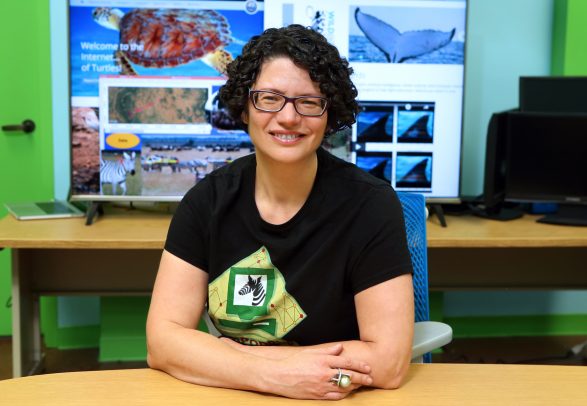University Scholar Tanya Berger-Wolf
The University Scholars Program, now in its 34th year, honors faculty members for superior research and teaching, along with great promise for future achievements. The award provides $15,000 a year for three years.
Years at UIC: 14
What are your research interests?
As a computational ecologist, my research is at the unique intersection of computer science, wildlife biology, and social sciences. I create computational approaches that are part of every stage of the scientific process of understanding animal sociality, from intelligent data collection (crowdsourcing photographs and identifying individual animals from photographs by stripes and spots — Wildbook.org) to hypothesis formulation (by designing a novel computational framework for analysis of dynamic social networks), and provide scientific insight into collective behavior of zebras, baboons, and other social animals (humans included). As a legitimate part of my research, I get to fly in a super-light airplane over a nature preserve in Kenya, taking a hyper-stereo video of zebra populations and learning how to identify each one of them by the unique stripe pattern.
How did you become interested in these topics?
While my undergraduate and Ph.D. work was very focused on theoretical computer science, in my work (as a research programmer) and everyday life, I spent a lot of time modeling wildlife habitats and thinking about ecological questions (thanks to my ecologist husband). I often would end up thinking, “There has got to be a better way of answering this question!” (A very engineering response to life). So after my Ph.D., I decided to intentionally find a way to answer ecological questions in a different, more computational way. I did a couple of postdocs, I spent time in ecology departments, and I got to know amazing ecologists who were willing to think about the crazy ideas of the new field we named “computational ecology.” One of them, Dr. Dan Rubenstein (Princeton), became a lifelong collaborator. He got me interested in zebras, convinced me to come to Kenya, helped convince a whole bunch of computer science students to come to Kenya, and co-founded the Wildbook project. I am also grateful that UIC from the beginning gave me the freedom to explore these crazy ideas.
What do you teach?
I teach a range of courses, from the specially designed introductory computer science course based on biology applications (CS111 Green) and the main algorithms course (CS401) to the graduate class in computational biology algorithms (CS502) and the unique Field Computational Ecology course with a substantial fieldwork component in Kenya (CS594).
How do you balance teaching and research?
All the courses I teach have a big dose of my research in them, either in some example applications and problems or as research subprojects in the advanced classes. Students from my classes often end up doing a research project in the lab. I have worked with students from high school to Ph.D.s, collaborating on real research projects. One of the reasons I came to academia is the connection with students, who are obviously integral both to my teaching and research. I like mentoring, and I see teaching and research as different aspects of mentoring.
What’s your advice to students who want to focus their future careers on research?
Try it! Read, find questions that grab your attention. Find a professor who is willing to take you on for a project (this may be at a different university, this may not be paid). Find the right intersection of what is interesting to you and what you are good at. Be creative, be fearless, be stubborn. Decide whether research is right for you. Because the majority of the time spent doing research is frustrated stubbornness of trying to get to an answer in the 100th way after 99 of them have failed. But the reward is having a thought, an idea, and seeing it through all the way to its becoming a reality, having a question and being the first one to hold the answer.
And to quote the first computer programmer in history, Ada Byron, Lady Lovelace (5 January 1841):
“We talk much of Imagination. We talk of the Imagination of Poets, the Imagination of Artists etc.; I am inclined to think that in general we don’t know very exactly what we are talking about…
It is that which penetrates into the unseen world around us, the world of Science. It is that which feels and discovers what is, the real which we see not, which exists not for our senses. Those who have learned to walk on the threshold of the unknown worlds… may then with the fair white wings of Imagination hope to soar further into the unexplored amidst which we live.”
I can’t wait to see what the future researchers will discover!

